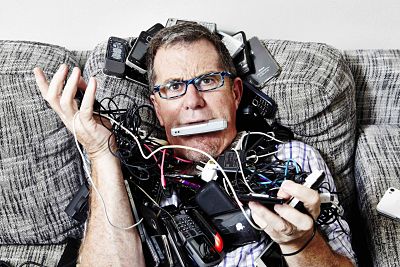
Unused old mobile phones now officially outnumber human beings in Australia according to the latest data snapshot from product stewardship outfit MobileMuster, with the group likening the giant hidden e-waste stockpile to a retro cool collectibles market national hoarding addiction.
Despite being a nation that relentlessly pursues hardware upgrades, it seems Australians are actually so loathe to let their heritage handsets go that the number of dead devices has exploded to 25.5 million units, a solid 1.5 million more than the current count on Australian Bureau of Statistics’ population clock.
It’s an ignominious achievement that MobileMuster, environmental groups and councils want reversed as soon as possible; not least because of the logistical problems of safely recycling the devices which the proponents say has now reached a “critical mass”.
The sad truth is that a dead mobile, unlike a dead laptop, is just too easy to hide in the botom drawer and then the bin – hence the big wake-up call.
“We want people to start thinking about the environmental benefits of recycling their old mobiles,” said MobileMuster’s Recycling Manager, Spyro Kalos.
“Think of your mobile as a miniature mine, with 95 per cent of the materials and precious minerals from recycled phones being recovered and put back into the supply chain”.
Of course the pressing need to keep highly toxic technowaste out of landfill is the core reason why recycling and product stewardship schemes like MobileMuster even exist.
But there’s another really important consequence of Australia’s recidivist tendency to cling to old phones.
To make e-recycling plants cost effective for councils, industry and taxpayers, the giant processing facilities actually need a relatively consistent throughput of product to stay above water rather than lumpy, dumpy uneven tranches of rubbish.
If there was really big money in recycling technology, someone would be offering you scrap prices for it – and they don’t. Even charity shops refuse this stuff.
So while there’s always an environmental need to recycle electronic hardware, the actual cost is shared between taxpayers and industry with big capital outlays needed to set up.
Another reason why e-cycling is a much harder business than most (think paper, glass, plastic) is that constant shifts in technology trends always throw-up new challenges.
Take the convergence of computing onto mobile devices like phones and tablets that hit sales of products like desktops and laptops hard, not to mention in-house servers that were gazumped by the cloud – all are comparatively bulky products that eventually dissipate from the recycling supply chain.
In the meantime, the number of smaller devices gets bigger and bigger making it more and more imperative for people to let go of redundant technology.
Technology self-disrupts, so thus the e-waste stream is constantly changing .
That’s why MobileMuster is now resorting to playing on peoples’ fears of being labelled an un-cool hoarder in a society of zen minimalists in order to get them to dump their handest museums.
And desperate times require desperate measures.
One of MobileMuster’s more extreme actions has been to recruit what it claims is a “renowned de-cluttering expert” in the form of Peter Walsh.
MobileMuster says it’s now “on the hunt to track down Australia’s biggest mobile phone hoarder” an award that will provide free brainwashing therapy in the form of “a dream decluttering pack worth over $3,230, including personal home organisation sessions” that will “help you on your journey to a clutter free life.”
It sounds almost as dangerous as the fetishized cult decluttering fantasies of Marie Kondo (see below) who advocates expressing affection, talking to and gently stroking clothes as you fold them to put them away standing up.
Be afraid. Be very afraid. Just hand in the phone.





Best if consumers could ‘trade-in” or hand back old phones to retailer when upgrading. Retailer then ships back to supplier/manufacturer, Complete circle rather than cradle to grave.
I believe that until a price is put on ALL recycling eg phones, soft plastic, cardboard, glass, plastic containers nothing will get solved as its easier to throw it all in your bin then spending money and time you don’t have living under the poverty line. Also you payed good money for it and it’s yours so why give it away to someone else to give money for when you can just throw it away and not have to put any effort into. If it’s yours and it can be used don’t give it away use it eg plastic bottle and soft plastic make eco bricks to build garden benches, wall etc. Look at the plastic bottle recycling centres in South Australia paying there customers for bottles sorted into colours and cleaned, they were the only state able to and getting top dollar from overseas recyclers in China. Pay people for dead and damaged phones like even just $5 for broken ones and everyone will stop hoarding there devices I can’t believe for a second that would send the broke, after all 80% of the phone can be recycled. Whether this is true that’s the general thoughts of the masses.